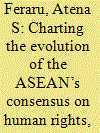| Srl | Item |
| 1 |
ID:
192168


|
|
|
|
|
| Summary/Abstract |
This article provides a comprehensive understanding of the roles and functions of ASEAN’s human rights regime by building on widely documented, consistent findings relating to the purpose of the association and the nature of its human rights institutions. In particular, the paper starts by emphasizing that, despite continuing debate over the nature and achievements/failures of the regional grouping, scholarship tends to converge on the two important aspects: ASEAN’s normative framework and its long-standing practice of ‘quiet diplomacy’ are designed to reassure incumbent governments weary of unwanted interference in internal affairs; and regional human rights institutions are primarily ASEAN bodies. These findings are formulated as assumptions guiding the analysis of the association’s human rights rhetoric and practice, which centers on the evolution of intergovernmental consensus, the role of the ASEAN Intergovernmental Commission on Human Rights (AICHR) in advancing this consensus, and an assessment of ASEAN responses to gross violations perpetrated or supported by governing elites. This latter examination details regional responses to the 2014 military coup in Thailand, Philippines’ brutal and largely extrajudicial ‘war on drugs’, the Rohingya genocide, and the 2021 military coup in Myanmar and ensuing violence.
|
|
|
|
|
|
|
|
|
|
|
|
|
|
|
|
| 2 |
ID:
103993


|
|
|
|
|
| Publication |
2011.
|
| Summary/Abstract |
This article analyses coalition survival in eleven post-Communist, Central and Eastern European democracies. Survival analysis demonstrates that Communist Successor Parties (CSPs) are central to understanding government dissolution processes in post-communism. Coalitions spanning the 'regime divide' between CSPs and parties not affiliated with the ancien regime last longer than governments that do not. Regime divide governments also are more likely to fall during periods of positive economic performance, while other governments fall during periods of negative economic performance. The reason lies in parties' incentives to prolong their regime divide coalition with the CSP, especially in the face of adverse conditions.
|
|
|
|
|
|
|
|
|
|
|
|
|
|
|
|
| 3 |
ID:
119682


|
|
|
|
|
| Publication |
2012.
|
| Summary/Abstract |
After two decades of parliamentary democracy, the countries of Central and Eastern Europe (CEE) have quite different records of government stability. At the same time there continues to be turbulent fluctuation within the individual countries. To explain this variation, the authors draw on characteristics of parties and party systems for 138 governments in 12 CEE countries. The analysis is structured by two distinct logics that underlie the effect of party-related attributes on government survival: the logic of internal friction within the government and the logic of external pressure from the opposition. The authors argue that in the "difficult" contexts of postcommunist party systems, these two logics do not operate independently of each other. Instead, they suggest that standard theory needs to be revised to account for the interactions of government and opposition characteristics. Their model of these interactions not only includes standard numeric and ideological variables but also integrates specificities of the postcommunist context: the regime divide and the low degree of party-system consolidation. Quantitative and qualitative findings demonstrate that government stability in CEE is interactively determined by whole constellations of party attributes.
|
|
|
|
|
|
|
|
|
|
|
|
|
|
|
|